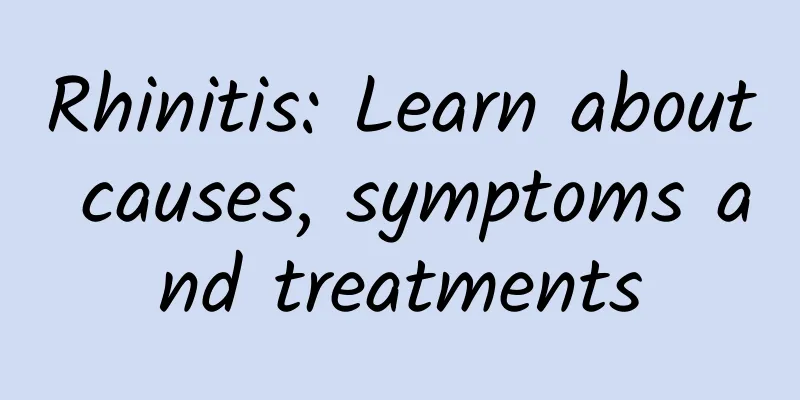Rhinitis: Learn about causes, symptoms and treatments

|
Rhinitis is a common nasal disease that has a certain impact on the patient's quality of life and health. This article will introduce the basic concepts, classifications, symptoms, diagnosis and treatment of rhinitis to help you better understand and prevent rhinitis. 1. Basic concept of rhinitis Rhinitis refers to an inflammatory disease of the nasal mucosa. It can be acute or chronic, and manifests itself as nasal congestion, runny nose, sneezing, nasal itching, etc. The causes of rhinitis are varied, including allergies, infections, air pollution, low immunity, etc. 2. Classification of rhinitis Rhinitis is mainly divided into the following types: Allergic rhinitis: also known as allergic rhinitis, is the most common type of rhinitis. It mainly manifests itself in symptoms such as nasal congestion, runny nose, sneezing, and nasal itching after contact with allergens. Acute rhinitis: Also known as cold or flu, it is an inflammation of the nasal cavity caused by viral infection. It mainly manifests itself in symptoms such as nasal congestion, runny nose, sneezing, nasal itching, and sometimes accompanied by fever, cough and other symptoms. Chronic rhinitis: Chronic rhinitis is a long-lasting nasal inflammation with symptoms including nasal congestion, runny nose, sneezing, nasal itching, etc. Chronic rhinitis is usually caused by repeated attacks of acute rhinitis or incomplete cure. Atrophic rhinitis: This is a rare nasal inflammation, mainly manifested by nasal mucosal atrophy, dryness, nasal congestion and other symptoms. It may be related to endocrine disorders, malnutrition and other factors. Drug-induced rhinitis: Inflammation of the nasal cavity caused by long-term use of certain drugs (such as nasal decongestants). It mainly manifests itself in symptoms such as nasal congestion and runny nose, and in severe cases may lead to atrophy of the nasal mucosa. Vasomotor rhinitis: This is a type of nasal inflammation related to neural regulation. Its symptoms are similar to those of allergic rhinitis, but without the immunoglobulin E (IgE)-mediated reaction process. Its occurrence is related to endocrine disorders, psychological stress and other factors. Rhinitis during pregnancy: Rhinitis during pregnancy refers to inflammation of the nose during pregnancy, with symptoms including nasal congestion, runny nose, sneezing, etc. Rhinitis during pregnancy may be related to changes in hormone levels. Occupational rhinitis: Occupational rhinitis refers to inflammation of the nasal cavity caused by exposure to certain substances (such as chemicals) at work. Its symptoms include nasal congestion, runny nose, sneezing, etc., and in severe cases, it may cause difficulty breathing. Autoimmune rhinitis: Autoimmune rhinitis refers to inflammation of the nasal cavity caused by abnormal attack of the nasal mucosa by the immune system. Its symptoms include nasal congestion, runny nose, sneezing, etc., and sometimes accompanied by symptoms such as nose bleeding. 3. Symptoms of rhinitis Symptoms of rhinitis vary depending on the type, but usually present as nasal congestion, runny nose, sneezing, nasal itching, etc. These symptoms may be aggravated by exposure to allergens, colds, or air pollution. In addition, patients may also experience symptoms such as headaches, insomnia, and memory loss. 4. Diagnosis and treatment of rhinitis Diagnosis: Doctors usually diagnose rhinitis based on the patient's symptoms, medical history, and examination results. Examinations may include rhinoscopy, allergen testing, and blood tests. Through these examinations, doctors can understand the patient's condition and cause, and develop an appropriate treatment plan for the patient. Treatment: The treatment of rhinitis varies according to the type, mainly including drug treatment and non-drug treatment. Drug treatment mainly includes anti-allergic drugs, anti-inflammatory drugs, etc.; non-drug treatment mainly includes avoiding contact with allergens, keeping the indoor air fresh, etc. For chronic rhinitis and atrophic rhinitis, surgical treatment may be required. In addition, patients can also relieve symptoms through physical therapy, traditional Chinese medicine treatment and other methods. Prevention: The key to preventing rhinitis is to avoid contact with allergens and keep the indoor air fresh. At the same time, strengthening exercise and improving immunity can also effectively prevent the occurrence of rhinitis. For patients with occupational rhinitis, they should pay attention to protective measures in the working environment; for patients with rhinitis during pregnancy, they should pay attention to maintaining a happy mood and regular prenatal check-ups. Note: In daily life, patients should keep their nasal cavity clean and moist, and avoid bad habits such as picking their noses with their hands and blowing their noses hard. At the same time, avoiding contact with irritating substances and harmful gases such as smoke is also one of the important measures to prevent rhinitis. Home care: For patients with rhinitis, home care is also very important. Patients should pay attention to maintaining indoor air circulation and moderate humidity, and avoid contact with allergens and irritants. At the same time, maintaining a balanced diet and proper exercise can also help improve immunity and prevent the occurrence of rhinitis. |
<<: What are the treatments for inflammatory bowel disease (IBD)?
>>: The 9-valent vaccine is only valid for 8 years? How long does the HPV vaccine last?
Recommend
How to match a horse-faced skirt? Matching skills of horse-faced skirt
During the Mid-Autumn Festival, a traditional reu...
What is the cause of abnormal leucorrhea and lower back pain?
Every woman hopes to be healthy, but some gynecol...
What causes abdominal pain after miscarriage?
There is no doubt that abortion has a great impac...
37 weeks pregnant belly how long will it take to give birth
From the 36th week of pregnancy until the fetal h...
Why is ocean exploration so important? The impact of nuclear wastewater on marine life
Ocean is the general term for the largest body of...
Does cervical erosion cyst require surgery?
As we all know, cervical erosion is a type of chr...
Drinking Chinese medicine makes menstrual color darker
When taking Chinese medicine to regulate the body...
Eight and a half months pregnant belly falling
As a woman's pregnancy progresses, she may be...
When will the TV series The Female Forensic Doctor of Tang Dynasty be broadcasted? Which channel can I watch The Female Forensic Doctor of Tang Dynasty?
Recently, due to the impact of the epidemic, ever...
What is a breast lump?
Many women will have various symptoms in their bo...
What are the symptoms of syphilis in women?
In recent years, surveys have found that people&#...
What kind of anti-inflammatory medicine should I take after having an abortion?
For female friends. After an abortion, in order t...
What does sneezing one, two, three mean? What should you pay attention to when you sneeze?
Sneezing is a life mechanism. It generally refers...
Why can't you eat mango when you have your period?
Mango is rich in fiber. Some people think that ma...
What happens if you stay in the toilet for a long time during pregnancy?
For many girls, their daily life is not very conv...









